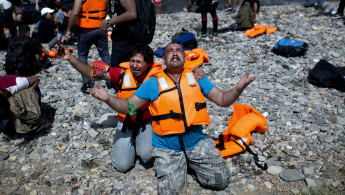UK to re-settle 20,000 Syrian refugees
Britain will take 20,000 Syrian refugees from camps near the war-torn country's borders over the next five years, Prime Minister David Cameron said Monday.
"We are proposing the UK should resettle up to 20,000 refugees over the rest of this parliament," Cameron said in a statement in the House of Commons.
"In doing so, we will continue to show the world that this country is a country of extraordinary compassion, always standing up for our values and helping those in need," he added.
Britain will continue to take refugees from the camps and from elsewhere in Jordan, Lebanon and Turkey, he said.
"This provides refugees with a more direct and safe route to the UK, rather than risking the hazardous journey to Europe," explained Cameron.
New arrivals will be given five-year "humanitarian protection" visas upon arrival in Britain and priority will be given to vulnerable refugees such as orphans, according to the prime minister.
The announcement comes after Cameron said on Friday that Britain will provide an extra £100 million ($153 million) in humanitarian aid for the Syrian crisis, bringing its total contribution to more than £1 billion.
"That is the UK's largest-ever response to a humanitarian crisis. No other European country has come close to this level of support," the British leader said.
The bulk of the extra funds, £60 million, will be used to provide aid for Syrians in Syria - while the rest will go to neighbouring nations such as Jordan and Turkey with huge numbers of Syrian refugees, he added.
Although the government plans to bring refugees from camps neighbouring Syria into Britain, it is not planning to accommodate those who have already entered Europe.
Cameron has for months had insisted that it made more sense to provide more aid rather than bring people to Britain.
Under pressure
The UK leader has been under pressure internationally and domestically to address the refugee crisis.
On Monday he vowed to "help to stabilise countries where the refugees are coming from" and the figure represents a vast expansion of Britain's refugee programme, a change signalled by Cameron last week.
On Thursday, he said he was "deeply moved" by images of three-year-old Syrian toddler Aylan Kurdi, found dead on a Turkish beach.
Cameron said he would "seek a solution to the crisis in Syria, push for the formation of a new unity government in Libya and bust the criminal gangs."
Charity Oxfam welcomed Cameron's announcement, calling it an important first step.
"It will give much needed respite to people fleeing horrors most of us can only imagine," said Mark Goldring, Oxfam's chief executive.
"This is a good step forward, but its far from job done."
Britain has accepted 216 Syrian refugees under a special government scheme over the past year and nearly 5,000 Syrians have been granted asylum since the conflict there broke out in 2011 - a number far fewer than countries like Germany and Sweden.
Britain has also opted out of a quota system for relocating asylum seekers within the European Union despite growing calls in the EU for fairer distribution.
More than four million Syrians have fled the war.



